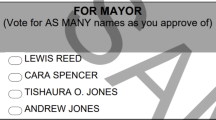Abstract
We assume that people have a need to make statements, and construct a model in which this need is the sole determinant of voting behavior. In this model, an individual selects a ballot that makes as close a statement as possible to her ideal point, where abstaining from voting is a possible (null) statement. We show that in such a model, a political system that adopts approval voting may be expected to enjoy a significantly higher rate of participation in elections than a comparable system with plurality rule.
Similar content being viewed by others
References
Aragones E., Postlewaite A. (2002) Ambiguity in election games. Review of Economic Design 7: 233–255
Arrow K. J. (1953) The role of securities in the optimal allocation of risk-bearing, Econometrie; as translated and reprinted in 1964. Review of Economic Studies 31: 91–96
Brams S. J., Fishburn P. C. (1978) Approval voting. American Political Science Review 72: 831–847
Brams S. J., Fishburn P. C. (1983) Approval voting. Birkhauser, Boston
Brams S. J., Fishburn P. C. (2005) Going from theory to practice: The mixed success of approval voting. Social Choice and Welfare 25(2): 457–474
D’Amasio A. (1994) Descartes’ error. Putnam, New York
Downs A. (1957) An economic theory of democracy. Harper Collins Publishers, New York
Foa E. B., Feske U., Murdock T., Kozak M. J., McCarthy P. R. (1991) Processing of threat-related information in rape victims. Journal of Abnormal Psychology 100: 156–162
Frank R. H. (1988) Passions within reason: The strategic role of emotions. Norton, New York
LeDoux J. E. (1996) The emotional brain. Simon and Schuster, New York
Lohmann S. (1993) A signaling model of informative and manipulative political action. American Political Science Review 87(2): 319–333
Lohmann S. (1994) Information aggregation through costly political action. American Economic Review 84(3): 518–530
Pennebaker J. W., Barger S. D., Tiebout J. (1989) Disclosure of traumas and health among holocaust survivors. Psychosomatic Medicine 51: 577–589
Riker W., Ordeshook P. (1968) The calculus of voting. American Political Science Review 62: 25–42
Weber R. J. (1995) Approval voting. Journal of Economic Perspectives 9: 39–49
Author information
Authors and Affiliations
Corresponding author
Rights and permissions
About this article
Cite this article
Aragones, E., Gilboa, I. & Weiss, A. Making statements and approval voting. Theory Decis 71, 461–472 (2011). https://doi.org/10.1007/s11238-010-9208-5
Published:
Issue Date:
DOI: https://doi.org/10.1007/s11238-010-9208-5




